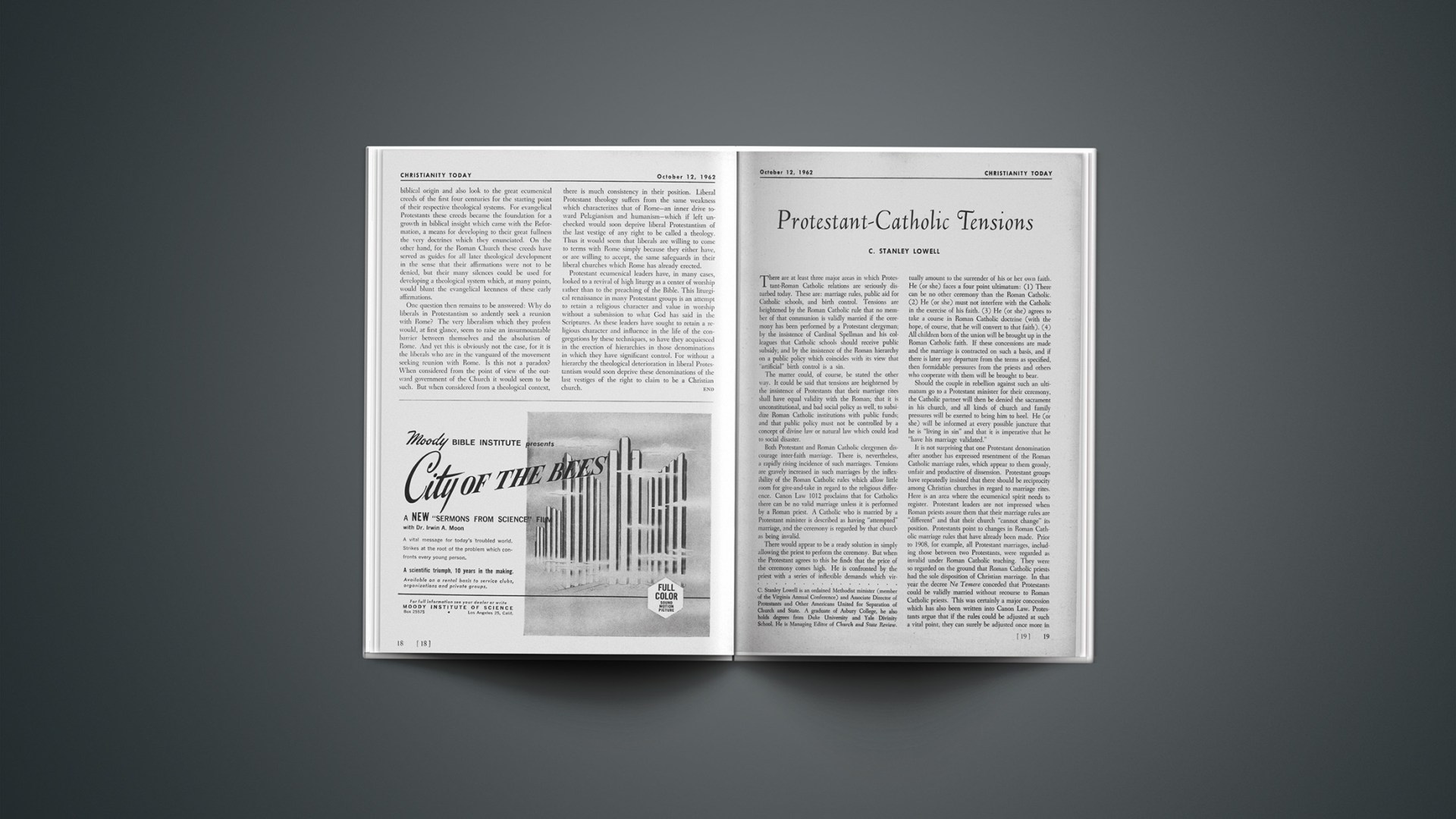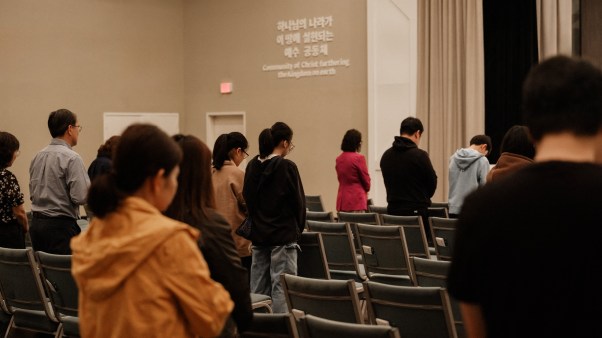There are at least three major areas in which Protestant-Roman Catholic relations are seriously disturbed today. These are: marriage rules, public aid for Catholic schools, and birth control. Tensions are heightened by the Roman Catholic rule that no member of that communion is validly married if the ceremony has been performed by a Protestant clergyman; by the insistence of Cardinal Spellman and his colleagues that Catholic schools should receive public subsidy; and by the insistence of the Roman hierarchy on a public policy which coincides with its view that “artificial” birth control is a sin.
The matter could, of course, be stated the other way. It could be said that tensions are heightened by the insistence of Protestants that their marriage rites shall have equal validity with the Roman; that it is unconstitutional, and bad social policy as well, to subsidize Roman Catholic institutions with public funds; and that public policy must not be controlled by a concept of divine law or natural law which could lead to social disaster.
Both Protestant and Roman Catholic clergymen discourage inter-faith marriage. There is, nevertheless, a rapidly rising incidence of such marriages. Tensions are gravely increased in such marriages by the inflexibility of the Roman Catholic rules which allow little room for give-and-take in regard to the religious difference. Canon Law 1012 proclaims that for Catholics there can be no valid marriage unless it is performed by a Roman priest. A Catholic who is married by a Protestant minister is described as having “attempted” marriage, and the ceremony is regarded by that church as being invalid.
There would appear to be a ready solution in simply allowing the priest to perform the ceremony. But when the Protestant agrees to this he finds that the price of the ceremony comes high. He is confronted by the priest with a series of inflexible demands which virtually amount to the surrender of his or her own faith. He (or she) faces a four point ultimatum: (1) There can be no other ceremony than the Roman Catholic. (2) He (or she) must not interfere with the Catholic in the exercise of his faith. (3) He (or she) agrees to take a course in Roman Catholic doctrine (with the hope, of course, that he will convert to that faith). (4) All children born of the union will be brought up in the Roman Catholic faith. If these concessions are made and the marriage is contracted on such a basis, and if there is later any departure from the terms as specified, then formidable pressures from the priests and others who cooperate with them will be brought to bear.
Should the couple in rebellion against such an ultimatum go to a Protestant minister for their ceremony, the Catholic partner will then be denied the sacrament in his church, and all kinds of church and family pressures will be exerted to bring him to heel. He (or she) will be informed at every possible juncture that he is “living in sin” and that it is imperative that he “have his marriage validated.”
It is not surprising that one Protestant denomination after another has expressed resentment of the Roman Catholic marriage rules, which appear to them grossly, unfair and productive of dissension. Protestant groups have repeatedly insisted that there should be reciprocity among Christian churches in regard to marriage rites. Here is an area where the ecumenical spirit needs to register. Protestant leaders are not impressed when Roman priests assure them that their marriage rules are “different” and that their church “cannot change” its position. Protestants point to changes in Roman Catholic marriage rules that have already been made. Prior to 1908, for example, all Protestant marriages, including those between two Protestants, were regarded as invalid under Roman Catholic teaching. They were so regarded on the ground that Roman Catholic priests had the sole disposition of Christian marriage. In that year the decree Ne Temere conceded that Protestants could be validly married without recourse to Roman Catholic priests. This was certainly a major concession which has also been written into Canon Law. Protestants argue that if the rules could be adjusted at such a vital point, they can surely be adjusted once more in order to make possible full reciprocity of marriage rites.
On the parochial school aid question, only the ultra-naive fail to understand its acerbity is due to a religious issue. All the talk about aid to “private schools” and “independent schools” cannot obviate this fact. After all, more than 90 per cent of the schools involved are Roman Catholic schools, wholly owned and managed by that hierarchy. The emotional vehemence this issue regularly stirs up is simply due to the fact that millions of Protestants and others resent what they regard as a proposal to tax them for the support of Catholic schools.
The drive to secure tax funds for the support of Catholic schools was launched in New York State by Archbishop Hughes in the 1840’s. He was overwhelmingly defeated, and strictures on public aid to church schools were written into the New York constitution. Then, in the late 1940’s one of Archbishop Hughes’s successors, Francis Cardinal Spellman, took up the drive again. Cardinal Spellman spurned an offer of loans for his denominational schools, an offer by which politicians sought to resolve the controversy. The cardinal wants not loans (to be repaid) but public grants.
Cardinal Spellman’s position has been implemented in the states and in local communities by a group called Citizens for Educational Freedom. While it has a few Protestants in front posts, the effective leadership and more than 90 per cent of the membership of this organization is Roman Catholic. Its purpose is to defeat public school bond elections, to secure commitments from political candidates in regard to public aid to Catholic schools, to change state constitutions and laws so as to permit such aid, and to exert pressure for whatever benefits for Catholic schools may be immediately obtainable. Citizens for Educational Freedom has many of the earmarks of a Roman Catholic political party. It could develop into something analogous to the “Christian Democratic” parties well known in other lands. Its reception is being closely studied by the hierarchy. Meanwhile its aggressive thrust in half a dozen states severely exacerbates inter-creedal tensions.
The Roman Church was doomed to perhaps as much as a century of opposition to birth control programs by the “irrevocable decree” promulgated by Pope Piux XI in his encyclical on Christian Marriage in 1930. This pronouncement, strongly opposed by the French clergy, has placed the Roman Church in a most untenable position. Its leadership has sought an abatement of the position by approval of the so-called “rhythm method” of birth control. Roman theologians have averred that this method has differences from other methods which make it morally acceptable. Other methods are “artificial” but the rhythm method is “natural.” It is unfortunate that the method singled out for approval is notoriously unreliable in contrast with other methods which are virtually 100 per cent sure.
Many leading Protestant churches have now taken a position on birth control which is almost diametrically opposed to that of the Roman Church. They insist that it is essential to the exercise of their faith that their members have access to the very information and the very procedures which the Roman hierarchy denounces as in violation of divine law. What appears to be a simple denominational difference becomes complicated in the realm of public policy. Roman Catholic leadership frequently has recourse to political action in order to keep anti-birth-control laws on the books of such states as Massachusetts and Connecticut. Catholic priests charge that these laws were originally enacted by Protestants and that they are only seeking to preserve them. Protestant leaders acknowledge the truth of this but insist that the population explosion has compelled them to change their mind about such laws, which they now regard as dangerous and obscurant. A change of mind, no matter how clearly indicated and imperative, would seem to be more difficult under the Roman Catholic system.
The American Catholic hierarchy has injected itself strongly into the battle over birth control in relation to foreign aid programs. Its pronouncement declares “[United States Catholics] will not support any public assistance, either at home or abroad, to promote artificial birth prevention … whether through direct aid or by means of international organizations.” Statements like this have frightened politicians away from any direct confrontation of the massive problems of a world population, now three billion, which is due to be six billion in another 40 years. Any intelligent consideration of birth control in the United Nations is likewise thwarted by the prompt objection of nations where Vatican influence is strong. This intransigence frustrates our own foreign aid program, which sees food, medical care, and education assistance nullified by appalling increases in population. Of all the areas of inter-faith tension this one is potentially the most inflammable. Hostile reaction is rapidly building up among persons of other faiths and among Roman Catholics themselves who are beginning to feel that in the interest of human survival such clerical obstruction cannot be permitted to continue.
It is a tribute to the impotence of Protestant-Catholic dialogue that up to this point it has not come to grips with these three issues. On many occasions of dialogue they are not even mentioned. The feeling appears to be that the dialogue might be disturbed and even disrupted if real Protestant-Catholic differences were explored. Some feel, however, that dialogue which is merely sentimental will die of desuetude. Here, in these three areas, lies the real need for a Protestant-Catholic modus vivendi today. Bibulous ecumenism needs concretion.
END










